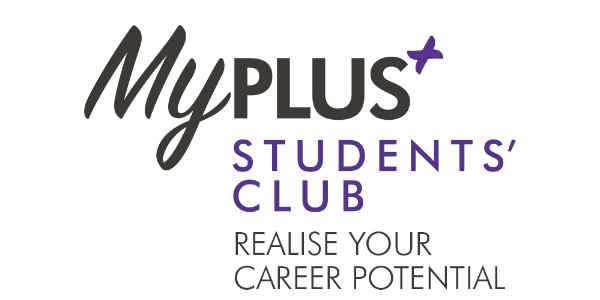Our faculty careers consultants work in partnership with the Disability and Wellbeing Service and other relevant agencies, to help assist students and graduates with their career planning.
Students with a disability* are strongly encouraged to make an individual appointment with a careers consultant as soon as possible on joining their course here at Strathclyde. While graduation may be a number of years away it is never too soon to start to make career plans e.g. for term-time or vacation employment; to do some job sampling; to discuss subject choice issues or how best to present to employers. The Careers Service will always endeavour to meet the needs of our students and graduates, and if you have a specific question you can e-mail us (yourcareer@strath.ac.uk).
MyPlus Students’ Club provides students with disabilities with the advice and support they need to navigate the recruitment process and achieve their career potential. Register for free with MyPlus Students’ Club for advice on openness, requesting adjustments and access to many more resources
Postgraduate study
Applying for postgraduate study or research? Guidance for disabled students applying for postgraduate study, designed to help students with a disability apply for a postgraduate course in the UK, has been published by the Disabled Students’ Commission and includes a helpful checklist.
Study abroad
This mobility with a disability guide contains detailed information on:
- travelling with disabilities post-Brexit
- funding and scholarships for students with disabilities
- disability support services in 5 European Countries
- top destinations for students with disabilities
Useful links
- Access to Work is a publicly funded employment support programme. It aims to help more disabled people start or remain at work. It can provide practical and financial support if you have a disability. It can also help you if you have a long-term physical or mental health condition
- AccessAble provides extra disability information at the University of Strathclyde
- AGCAS Disability Task Group Blog provides information, resources, and training for disabled students and graduates
- Autism Employability Skills is a free online course designed for autistic university students and graduates. It will help develop your employability skills. It may also be useful for any autistic person looking to develop these capacities. The course content has been developed by a team of experts, including autistic graduates, autistic workplace mentors, non-autistic university careers consultants, and non-autistic researchers
- Blind in Business is a national charity that helps blind and partially sighted people into work. They offer free one to one virtual appointments to discuss the support you may need and create a tailored plan of action, helping you become recruitment ready. Email: joe@blindinbusiness.org.uk
- British Dyslexia Association guidance on reasonable adjustments in the workplace
- British Stammering Association (STAMMA) provides resources to ensure your stammer doesn't hold you back from the job or career you want
- Centre for Mental Health is an independent, not for profit thinktank. They seek to eradicate mental health inequalities. They also fight injustice by changing policy and practice
- Dyslexia Scotland produces leaflets on a range of topics, including employment and the workplace. They also host events that you may find helpful
- Dyspraxia Foundation provides practical advice and tips to help manage Dyspraxia and Developmental Co-ordination Disorder (DCD) in everyday life including at university and in employment
- Epilepsy Action provides information about looking for and staying in work if you have epilepsy. There is also information about your rights if things at work become difficult because of your epilepsy.
- Exceptional Individuals is a social enterprise. It partners dyslexic and neurodiverse job seekers with employers across the UK. They run a wide range of free events for neurodiverse students
- Hear me out: accessing the legal profession as a deaf, young professional
- ME Association provides guides on a range of topics including education and employment
- MIND provides information (that applies to England and Wales only) on disability discrimination at work because of mental health. Find out about the laws that protect you from discrimination, plus where to go for support and advice.
- My Plus Students' Club will provide you with advice on topics such as the benefits of being open, accounting for differences in your CV, asking for adjustments in the recruitment process, and how to position your disability as a positive. Industry updates include case studies in which disabled graduates share their experience of the workplace
- MS Society provides information and resources to help you manage your MS at work.
- National Autistic Society provides support for autistic people and their families and includes advice and guidance on employment
- Royal Association for Deaf People (RAD) provides employment and careers support through DeafAdvance, a national service in BSL removing barriers to training and employment, helping deaf people secure meaningful work and progress. Educating and supporting employers and challenging discrimination.
- Royal National Institute for Blind people (RNIB) provides information and resources on employment and equality. They can help you whether you're looking for employment or need support to stay in your job
- Royal National Institute for Deaf People (RNID) provides support for people who are deaf, have hearing loss or tinnitus. Learn more about getting help to find a job and getting help from your employer if you’re in work.
- See Me is Scotland's national programme to end mental health stigma and discrimination. The resources include factsheets and an online newsletter
- Scottish Association for Mental Health (SAMH) provides tip and practical tools to support your wellbeing at work
- Use My Ability provides workshops aimed at helping disabled students boost employability skills. These workshops are informed by research with employers, academic staff careers staff, and disabled students. They are available to anyone
*Disability and long-term health conditions include, but are not limited to: visual and hearing impairments, mobility impairments, autism, diabetes, epilepsy, dyslexia, dyspraxia, mental health conditions, speech impairments, and major illnesses such as cancer and MS.

